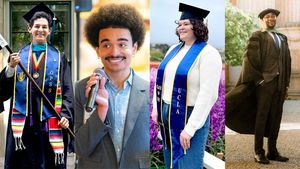I look at LGBT rights as one of the great inevitabilities of the 21st century.
In the same way that women's political, social, and economic achievement was a key theme of the last century, it is clear that the dominoes that block LGBT inclusion are falling.
Over the weekend, global attention turned to the U.S. Supreme Court. The 5-4 decision in favour of marriage equality has already rippled beyond the U.S. Prompted by the ruling, reporters asked Australian Prime Minister Tony Abbott to justify his position against marriage equality (he remains opposed). Shortly after the announcement of the decision, the Human Rights Campaign said that Australia ought to be the next nation for marriage equality, and was in their sights.
The court's decision sets the standard that modern human rights include LGBT matters, and conveys that the U.S. expects action on the issue.
But it is beyond this -- since President Obama's pivot to Asia, the U.S. plays a key role in setting standards in the region. Providing for marriage equality would allow for America to lift the bar globally.
The nations up and down the western side of the Pacific present a complex view of LGBT rights. Across Asia, there are limitations placed on LGBT people, and worse: Nations like Brunei will stone people to death for the "offense" of homosexuality.
At the bottom of Asia sits Australia, and we are in the midst of a deep debate on marriage equality. For something that the majority of Australians agree should be legal, our politicians remain divided.
It is a confusing situation. For a secular country that prides itself on egalitarian values, our politicians have taken a stridently bigoted conservative religious view. Australian businesses has thrown their support behind a proposed marriage equality measure, as have a growing number of Christian churches. This is becoming less of an issue in society at large, but our politicians strangely struggle.
What they fail to realize is that if the conservative elements of American society can accept marriage equality, so should we. The American ambassador to Australia has even announced that he is "hopeful" for marriage equality.
By not taking LGBT equality seriously, Australia and other mid-level powers shoot ourselves in the foot. It makes us look behind the ball. Failing to provide for LGBT rights shows that a country is bigoted, backwards, and well behind the international standard on human rights.
Support and access to human rights is what nations need to be taken seriously. Australia bats above its weight a lot, but on gender and sexuality issues we fall short. In spite of this we join with the U.S. on military and humanitarian efforts to promote the values we share -- opportunity, equality, and democracy. It would not be hard for Australia, with the largest economy in the region, to help set the standard here and through of Asia on LGBT rights. But we drag our feet like school children not wanting to be in class.
It doesn't take strength or courage to achieve equality, it takes will. Looking back on the major civil rights issues of the past 100 years, individual champions led the global conversation. It took female leaders like Indira Gandhi to push for women's participation in politics; it took black leaders like Rosa Parks and Martin Luther King Jr. for the world to take notice of racial divides.
This isn't a case of progressives and conservatives, it is about what we want our societies to be. Bigotry of any kind has no place in society, and that includes the unnecessary denying of governmental rights and freedoms. For any society that takes human rights seriously, granting those freedoms is the least they can do to push the needle forward.
The struggle toward dignity and rights is a global one. Australia needs to act.
 CONRAD LIVERIS is an Australian writer focusing on issues of gender equality and diversity.
CONRAD LIVERIS is an Australian writer focusing on issues of gender equality and diversity.
































 CONRAD LIVERIS is an Australian writer focusing on issues of gender equality and diversity.
CONRAD LIVERIS is an Australian writer focusing on issues of gender equality and diversity.














































